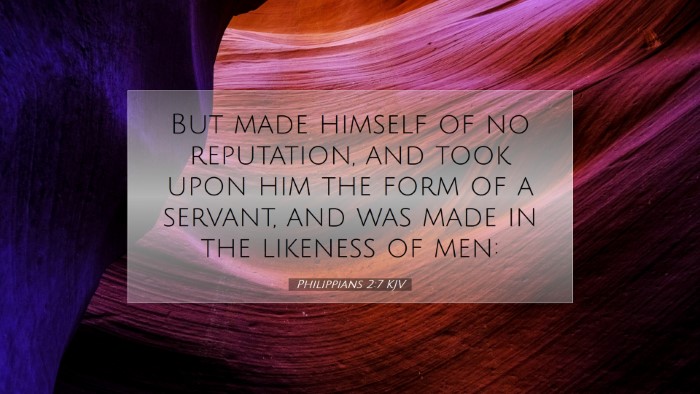Commentary on Philippians 2:7
Philippians 2:7 states: "But made himself of no reputation, and took upon him the form of a servant, and was made in the likeness of men." This verse stands as a profound statement on the nature of Christ’s incarnation and His example for believers. The commentary derived from respected public domain sources such as those by Matthew Henry, Albert Barnes, and Adam Clarke will provide insights that deepen our understanding of this pivotal scripture.
His Humility and Self-Emptying
Matthew Henry expands on the concept of Christ making Himself "of no reputation," noting that this signifies a deliberate act of humility, where the infinite and eternal God humbles Himself, taking on the form of a servant.
- Self-Emptiness: Christ’s action of self-emptying (kenosis) emphasizes His willingness to lay aside His divine privileges and glory.
- Contrast with Worldly Expectations: Unlike earthly leaders who seek honor and exaltation, Christ models a radical humility that challenges our natural inclinations.
- Purposeful Poverty: His renunciation of status was not for its own sake but was aimed at achieving redemption for humanity.
The Form of a Servant
Albert Barnes elucidates the significance of Christ taking "the form of a servant." He notes that this act connects Jesus with those He came to save, highlighting His role as the suffering servant prophesied in the Old Testament.
- Servanthood: Christ embodies the servant ideal as depicted in Isaiah 53, where the servant suffers for the transgressions of many.
- Servant Leadership: Through His example, Jesus redefines greatness not as dominion over others, but through service and sacrifice.
- Relational Aspect: By becoming a servant, Christ establishes a personal relationship with humanity, facilitating redemption through identifying with our struggles.
Likeness of Men
Adam Clarke emphasizes the profound mystery of Christ’s incarnation as "made in the likeness of men," focusing on the dual nature of Christ as fully divine and fully human.
- Authentic Humanity: Clarke designates this likeness as essential for Christ to be a true representative and mediator for humanity, enabling Him to empathize with human weaknesses.
- Divine and Human Duality: This verse encapsulates the mystery of the hypostatic union, where divine nature coexists in perfect harmony with human nature.
- Identification with Humanity: Christ's human experiences validate His role as our High Priest, interceding for us with understanding of our trials.
Theological Implications
The theological implications of Philippians 2:7 reach far beyond the incarnation itself, influencing Christian doctrine and ethical practices across generations. Key insights include:
- Christological Foundation: This passage underscores critical elements of Christology, affirming the nature of Christ as both God and man.
- Ethical Model: The humility and servanthood of Christ present a transformative moral paradigm for believers, shaping our attitudes and actions toward others.
- Redemptive History: The self-emptying of Christ initiates a historical narrative leading to His ultimate sacrifice, underscoring the redemptive plan of God for humanity.
Practical Application
For pastors, students, and theologians, Philippians 2:7 serves as a compelling call to emulate Christ's example in their own lives. Considerations include:
- Leading by Example: Church leaders are encouraged to adopt a servant heart in their ministry, striving for humility in the face of challenges.
- Community Engagement: Believers are called to engage in acts of service within their communities, reflecting Christ’s love through tangible actions.
- Personal Reflection: Regular introspection on one’s motivations and attitudes as a servant of Christ can foster greater spiritual maturity and effective witness.
Conclusion
Philippians 2:7 presents a profound picture of the grace and humility of Christ. His choice to take on the form of a servant and become like us informs our understanding of both His divinity and our calling as His followers. This commentary draws on the insights of revered theologians to encourage deeper appreciation and application of this rich verse, challenging each believer to reflect Christ in their life through humble service.


